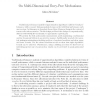Free Online Productivity Tools
i2Speak
i2Symbol
i2OCR
iTex2Img
iWeb2Print
iWeb2Shot
i2Type
iPdf2Split
iPdf2Merge
i2Bopomofo
i2Arabic
i2Style
i2Image
i2PDF
iLatex2Rtf
Sci2ools
102
Voted
ALDT
2009
Springer
2009
Springer
On Multi-dimensional Envy-Free Mechanisms
Traditional performance analysis of approximation algorithms considers overall performance, while economic fairness analysis focuses on the individual performance each user receives. In this paper we formulate the problem of fairness design in the context of resource allocation scenarios. The fair design problem is the design of computationallyefficient individually-fair mechanism to approximate a global goal. We present the first polynomial-communication profit-maximizing combinatorial auction for general bidders in an envy-free manner. Additionally, we study the canonical makespan-minimizing scheduling problem of unrelated machines and show upper and lower bounds. For the related machines model we show that tight algorithmic bounds can be achieved. Furthermore, using a shifting procedure we show how an interesting special case of post-auction resales can be prevented in quasi-polynomial time.
ALDT 2009 | Algorithmic Decision Theory | Economic Fairness Analysis | Fair Design Problem | Tight Algorithmic Bounds |
Related Content
| Added | 25 May 2010 |
| Updated | 25 May 2010 |
| Type | Conference |
| Year | 2009 |
| Where | ALDT |
| Authors | Ahuva Mu'alem |
Comments (0)

